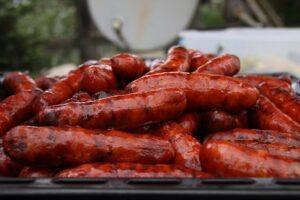Weber grills are one of the most popular brands, and for good reason. They’re durable, versatile, and easy to use. But there’s always a catch! Weber grills rust, which can be very annoying.
The Weber company has been making grills since 1952, when George Stephen Sr., Kettle Foods founder, invented the first kettle grill with a lid that could be closed tightly over coals.
The company’s first gas grill was introduced in 1958; it featured an adjustable burner valve so users could control heat levels more easily than with charcoal-based grills.
Today there are several different types of Weber Grills available: kettles (which have lids), porcelain enameled cast iron grates; Spirit E-210 & Genesis II LX S-310 LP Gas Premium Grill Package; Spirit E-310 LP Gas Premium Grill Package etc.
If you want to know if your grill will rust and how to prevent it once it does start rusting, keep reading!
Do Weber Grills Rust-Free?
The good news is that Weber grills are made from stainless steel, which means they are very strong and do not rust easily.
In fact, it’s pretty much impossible for them to rust at all under normal conditions. However, there are some circumstances where stainless steel can still get rusty.
This is because the term “stainless” refers only to chromium; other elements such as nickel or molybdenum can cause corrosion if present in high concentrations in the metal alloy used for your grill’s construction (for example: Type 304 Stainless Steel).
Additionally, if you use harsh cleaners on your grill or leave food residue inside it after cleaning then this could lead to pitting of the surface over time – causing rusting.–>
Keeping Weber Grill Grate from Rusting
You can prevent rust by taking a few simple steps. First and foremost, you should use a grill cover when you’re not using your grill. This will keep moisture out and protect it from the elements.
Second, it’s important to clean your grill after each use with hot water and mild soap or detergent (if desired). Be sure to rinse off any leftover food particles before drying with paper towels you don’t want them left on there!
Thirdly: don’t leave any standing water on top of your Weber; this may cause rusting issues over time too because of the presence of minerals in tap water (especially if you live somewhere with hard water).
Finally: don’t store grills outside during rainy seasons; doing so can lead directly into corrosion problems down the line
How To Get Rid Of Rust On Weber Grills
To remove rust from your grill, you can use a wire brush to remove the rust. Alternatively, you can use sandpaper to remove any remaining rust.
If you have access to a rust remover and want to save yourself some elbow grease, apply it directly on the rusted area and let it work its magic for about 30 minutes before scrubbing off with soap and water or an abrasive sponge.
Clean your grill thoroughly after removing all traces of rust so that there is no residue left behind which could cause future corrosion issues.
You should also consider using degreaser on your Weber Grill once every year or two when cleaning it regularly as this will help prevent any buildup from occurring in between major cleanings
Why Does Your Weber Grill Rust?
The main reason your grill rusts is because the grates are not coated with a protective layer. Without this protective layer, moisture can seep into the metal and cause it to corrode or rust.
The only way you’re going to prevent this from happening is by coating your grates with an oil before cooking on them every time you use your Weber grill (and cleaning them after each use).
If you don’t do this, then there may be another reason why your grill rusted: improper cleaning or neglecting to oil your grill before using it again. If so, then we recommend following our tips for cleaning your Weber Genesis II E-310 propane gas grill.
Conclusion
Weber grills are made of stainless steel, which is a very durable material that can withstand extreme temperatures and corrosive environments.
However, even with all of these advantages there are still some instances where rust can form on your grill.
This is caused by moisture getting into cracks in the surface or through scratches where dirt particles get trapped underneath preventing them from drying out when washed off.
